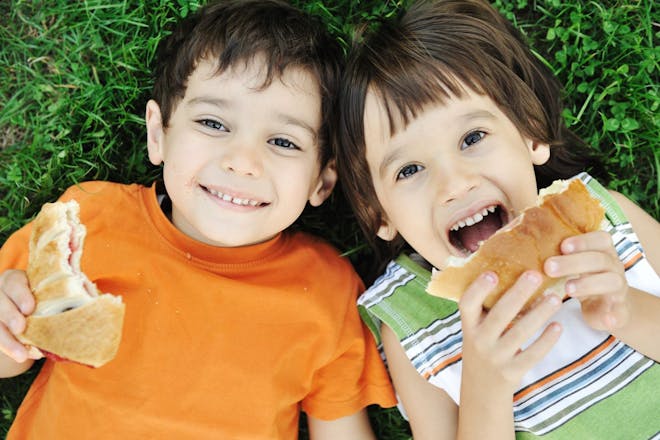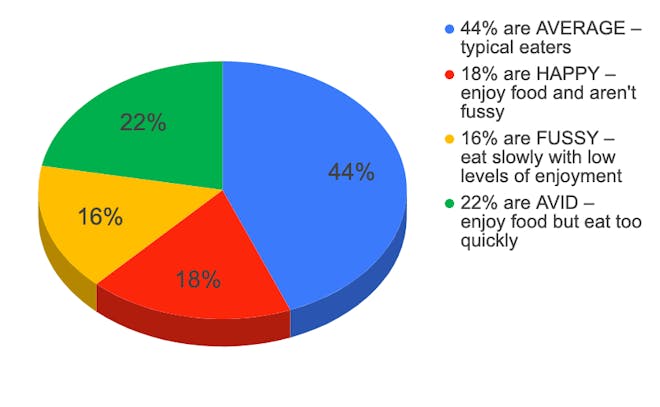What's YOUR child's eating style? Scientists reveal the 4 types of eater ... and only 16% are 'fussy'

Scientists surveyed nearly 1,000 parents and carers about their children's eating styles, and found all kids fit into four types of eater ... Here's what they found, and how you can help your kid eat more healthily TODAY
Mealtime battles are a reality for many parents and carers around the UK.
'Fussy eaters', food refusal and kids being too distracted to eat are common problems in many UK households.
But after research, experts at Aston University in Birmingham – who surveyed almost 1,000 parents to find out more about kids' eating habits – say the results suggest there may be fewer 'genuinely fussy eaters' out there than you might think.
Dr Abigail Pickard, lead author of the study, said: 'Parents can use this research to help them understand what type of eating pattern their child presents.
'Then based on the child's eating profile, the parent can adapt their feeding strategies to the child.
'For example, children in the avid eating profile may benefit more from covert restriction of food, for instance, not bringing snacks into the home or not having foods on display, to reduce the temptation to eat when kids aren't really hungry.
Dr Pickard also noted that children with avid eating are more likely to be active and impulsive, and that their caregivers are more likely to give them food to regulate their emotions. Using other strategies instead of food would be much more helpful.
- DWP announcement on third Cost of Living payment
- Scheme giving millions of low-income households £150 opens today
- Asda shoppers praise £20 boots 'identical' to £199 Kurt Geiger pai
- £16 Primark boots that'll get you through autumn to winter
- 3 questions ALL parents should ask at parents evening

What are the 4 eatings styles for kids?
Scientists found that all youngsters fit into 1 of 4 eating categories:
- Fussy
- Avid
- Happy
- or Typical
While 16% are classed as 'fussy', the other 84% are either avid, happy, or typical eaters.
In the study, the research team investigated eating behaviour patterns in primary school children.
They surveyed 995 parents and carers of 3 to 5 year olds in England and Wales about their children's eating habits across 8 behaviours:
- food responsiveness
- emotional overeating
- food enjoyment
- desire to drink
- satiety responsiveness (knowing when you're full)
- slowness in eating
- emotional undereating
- food fussiness

What are the results of the survey into kids' eating habits?
The majority of kids aren't fussy eaters, and have an average response to the eating behaviours listed above.
- 44% of kids have 'average' levels across all 8 behaviours, and are 'typical' eaters, according to the researchers
- 18% are 'happy' eaters, with high levels of food enjoyment, but low levels of slowness of eating, food fussiness, emotional overeating, and emotional undereating
- Only 16% are 'avoidant' or fussy eaters, meaning they have significantly high levels of food fussiness, they eat slowly and show signs of emotional undereating
- BUT 22% were classed as 'avid' eaters, who had an increased enjoyment of food, faster eating speed, and weaker sensitivity to internal cues of being full. And it's these kids who might need a bit more help...

Is my child an avid eater or happy eater?
The team are most interested in the 1 in 5 young children showing 'avid eating' tendencies.
These avid eaters have greater enjoyment of food, a faster eating speed, and weaker sensitivity to internal cues of 'fullness'.
These kids are different to the 'happy’ eaters (17.7% of children in the study), who have similarly positive responses to food, because avid eaters want to eat more in response to the sight, smell or taste of food, and they have a higher level of emotional overeating.
In combination, these eating behaviours can lead to overeating and weight gain.

How can I help my kid if they're in the fussy eater category?
Writing about the results of the survey in Appetite, Dr Pickard suggests: 'If a child shows fussy eating behaviour it would be beneficial for the child to have a balanced and varied selection of foods on show to promote trying foods without pressure to eat.'
For more tips on managing fussy eating check out these articles:
- Top tips for fussy eaters
- How to deal with your child if they're a fussy eater
- How to feed fussy eaters on a budget

Related stories
10 things I wish people knew about my fussy eater




.jpg?w=285&h=190&fit=crop&auto=compress%2Cformat&rect=75%2C0%2C1050%2C700)



